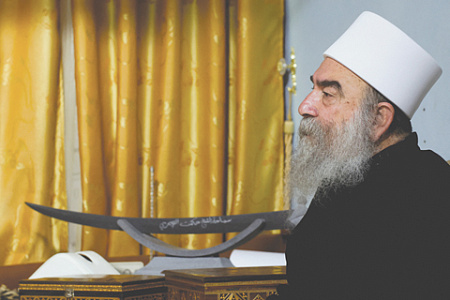
Armed factions in Syria’s southern Suwayda province, a region predominantly inhabited by the Druze minority, have announced the formation of their own National Guard. The new military alliance will reportedly answer to Sheikh Hikmat al-Hijri, a prominent spiritual leader of the Druze community who has advocated for the southern provinces to break from the jurisdiction of Syria’s transitional government. While Damascus publicly insists on national centralization, it is practically unable to assert control over several regions of the country.
The creation of the National Guard was declared by a coalition of at least 30 armed groups operating in Suwayda. In a joint statement, their commanders pledged to follow the directives of the community’s spiritual leadership, particularly Sheikh al-Hijri, whom Syrian authorities accuse of harboring separatist ambitions and fostering ties with Israel. This move follows al-Hijri’s earlier call this month to establish autonomous administrative bodies in Suwayda, parallel to the transitional government.
According to estimates by the Saudi newspaper Asharq Al-Awsat, the newly formed guard could command a force of approximately 4,000 to 5,000 fighters. However, support for the move is not unanimous among the province’s Druze leaders. Some fear it will escalate already tense relations with the transitional government headed by President Ahmed al-Sharaa. The guard’s stated mission is to protect the province’s borders, prevent the infiltration of militants, and combat arms and drug smuggling, while also organizing local security institutions.
The decision comes in the wake of significant ethnoreligious violence last month. On July 13, clashes erupted between Druze militias and local Sunni Bedouin tribes. The situation deteriorated when Damascus dispatched its own forces, which reportedly sided with the Bedouins and participated in attacks against the Druze. This prompted intervention from Israel, seen as a traditional protector of the Druze, which conducted airstrikes on government positions in Suwayda and symbolic targets at the Ministry of Defense complex in Damascus. The formation of the National Guard is likely intended to prevent a repeat of such events.
Damascus has openly acknowledged its limited authority in the southern provinces. Syria’s electoral commission recently announced that the upcoming parliamentary elections in September—the first since the change of power on December 8, 2024—will not be held in Suwayda and other de facto autonomous regions. An official stated that elections can only occur in territories under full government control, leaving parliamentary seats for these areas vacant for now.
Despite the reality on the ground, President Ahmed al-Sharaa has publicly maintained that Syria must be centralized. “I do not believe that Syria is threatened with division,” he told local media recently, dismissing efforts to create self-governing cantons as “impossible” and a product of foreign interference. He emphasized the need for a non-violent battle for unity through mutual understanding, stating that “Syria is tired of war.”
Meanwhile, the United States has expressed growing doubts about the feasibility of a unified Syrian state. Following the deadly clashes in Suwayda, U.S. Special Envoy for Syria, Thomas Barrack, who had previously advocated for a “united Syria,” conceded that the country might need to consider alternatives. “It probably won’t be a federation, but something smaller, where everyone is allowed to maintain their integrity, their culture, their language, and not be threatened by Islamists,” the American diplomat suggested. The future of Syria’s south will also likely be influenced by the influential Druze community within Israel, which maintains close ties with its Syrian brethren and actively shapes Israeli policy in the region.
